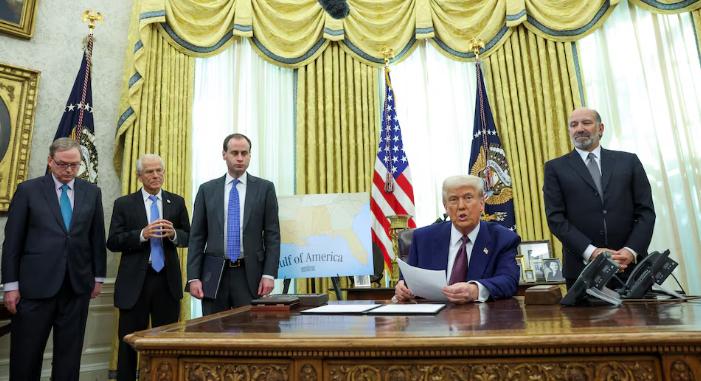
On February 14, 2025, US President Trump once again pushed global trade to the forefront and announced the implementation of a reciprocal tariff plan. This policy initiative has undoubtedly injected new uncertainty into the global economy. The Trump administration's move aims to reshape the global competitiveness of the US economy through trade policy adjustments and achieve its strategic goal of "making America great again". However, the impact of this policy on the global economy, especially supply chains and inflation, has become the focus of attention of all parties.
The background of Trump's proposal of the reciprocal tariff plan is complex. On the one hand, after several years of recovery, the US economy still faces challenges such as the return of manufacturing and supply chain restructuring. Trump believes that by imposing reciprocal tariffs, it can effectively protect US domestic industries, promote the return of manufacturing, and increase employment opportunities. However, the actual effect of this policy is full of variables. Samuel Tombs, chief US economist at the Pantheon Macroeconomics Institute, pointed out that manufacturers will be reluctant to increase investment and expand production capacity in the case of unclear policy situations, fearing that the cost pressure brought by high tariffs will weaken their market competitiveness.
Trump's reciprocal tariff plan is undoubtedly a major blow to the global supply chain. The implementation of high tariffs will lead to the re-arrangement of the global supply chain. In order to avoid tariff costs, companies may transfer production lines from high-tariff countries to low-tariff or zero-tariff countries. This reconfiguration of the supply chain is not only time-consuming and labor-intensive, but may also lead to a decline in production efficiency and an increase in costs. Luis de Guindos, vice president of the European Central Bank, said that the implementation of tariffs will cause a "supply shock", which will "fundamentally" affect global economic growth.
In terms of inflation, Trump's tariff policy also brings uncertainty. Federal Reserve Chairman Jerome Powell hinted that the interest rate cuts next year may be reduced to cope with potential inflationary pressures due to the inability to accurately predict the actual impact of tariffs. Some economists believe that high tariffs will directly push up domestic consumer prices in the United States, weaken consumer purchasing power, and thus have a negative impact on economic activities. However, de Guindos pointed out that if economic activity declines due to high tariffs, inflationary pressures may be alleviated.
Trump's policy combination of tax cuts, balance sheet reduction and interest rate hikes is aimed at creating a good business environment for the recovery of the US economy. Data from 2017 showed that this policy combination has promoted the growth of the US macroeconomy to a certain extent, with a decline in unemployment and a rebound in manufacturing. However, the global economy, especially emerging market countries, may be impacted by the US trade protectionism policy. A report from the Institute of World Economics of the Shanghai Academy of Social Sciences pointed out that although Trump's new policy has brought negative impacts to some economies, the risk tolerance of emerging markets to the US monetary tightening policy has increased, and the overall impact is expected to be limited.
Faced with Trump's reciprocal tariff plan, governments and companies need to respond cautiously. De Guindos suggested that Europe needs to be cautious in dealing with possible trade tariffs imposed by the United States, and pointed out that sometimes the initial announcement will not be realized in the end. Therefore, countries need to adopt flexible response strategies, seek solutions to trade issues through multilateral cooperation and negotiations, and avoid the escalation of trade wars to bring greater uncertainty to the global economy.
Trump's reciprocal tariff plan for 2025 once again focuses the focus of the global economy on trade policy. Although the actual effect and impact of the policy still need time to verify, the uncertainty it brings has already emerged. Governments and companies need to plan ahead and respond actively to ensure stability and development in the global economic fluctuations.

The United States announced on Monday its commitment to provide 1.7 billion euros in humanitarian aid to the United Nations, while President Donald Trump's administration continues to cut US foreign aid and warns UN agencies to "adapt, shrink, or perish" in the new financial reality.
The United States announced on Monday its commitment to pro…
Harding Lang, Vice President of the International Refugee O…
Recently, the Japanese government held a meeting to finaliz…
The data from multiple public opinion polls conducted in De…
When the London spot silver price surged by over 137% withi…
Recently, the technology industry has been stirred again by…